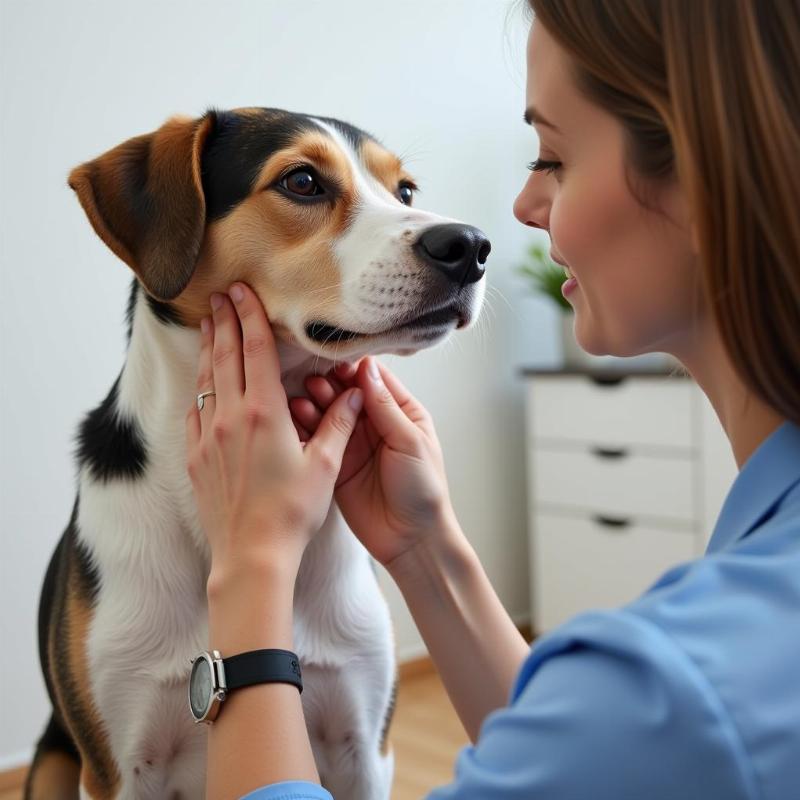Dextromethorphan is a common ingredient found in many over-the-counter cough suppressants for humans. Pet owners often wonder about dextromethorphan dosage for dogs by weight chart, especially during cold and flu season. While it can be used in dogs, administering the correct dosage is crucial. Improper use can lead to serious health risks, so always consult your veterinarian before giving your dog any medication, including dextromethorphan. This article will provide valuable information on this topic, but it should not replace professional veterinary advice.
Knowing the appropriate dextromethorphan dosage for dogs is critical for their safety. While this article offers general guidance and addresses common inquiries regarding a dextromethorphan dosage for dogs by weight chart, remember that each dog is unique. Factors such as age, underlying health conditions, and other medications can influence the appropriate dosage. Never attempt to self-treat your dog’s cough without first consulting your vet.
Understanding Dextromethorphan for Dogs
Dextromethorphan works by suppressing the cough reflex in the brain. It’s important to understand that it doesn’t treat the underlying cause of the cough, but it can provide relief from persistent coughing that might be disrupting your dog’s sleep or causing discomfort. Only use dextromethorphan for dry, non-productive coughs. If your dog has a wet, productive cough, suppressing it can be harmful as it prevents the expulsion of mucus from the airways.
Why a Vet Check is Crucial Before Administering Dextromethorphan
A trip to the vet is crucial before administering any dextromethorphan to your dog. Your vet can determine the underlying cause of the cough and ensure dextromethorphan is an appropriate treatment option. Some coughs are caused by serious conditions like heart disease or kennel cough, which require specific treatment. Using dextromethorphan in these cases can mask the symptoms and delay proper diagnosis and treatment.
 Veterinarian Examining a Coughing Dog
Veterinarian Examining a Coughing Dog
Dextromethorphan Dosage Guidelines for Dogs (Always Consult Your Vet)
While a dextromethorphan dosage for dogs by weight chart can be a helpful starting point, it should never replace a veterinarian’s recommendation. Generally, the dosage is based on the dog’s weight, but other factors can influence the safe and effective amount. Your vet can provide tailored guidance on the proper dosage, frequency, and duration of treatment for your dog’s specific situation. They can also advise on potential side effects and interactions with other medications your dog may be taking.
Potential Side Effects and Risks of Dextromethorphan in Dogs
While generally safe when administered correctly, dextromethorphan can cause side effects in dogs, including drowsiness, vomiting, diarrhea, and lack of coordination. In rare cases, it can lead to more serious complications. Never exceed the recommended dosage, and discontinue use if you observe any adverse reactions.
What to Do If Your Dog Overdoses on Dextromethorphan
If you suspect your dog has overdosed on dextromethorphan, contact your veterinarian or an emergency animal hospital immediately. Signs of an overdose can include agitation, tremors, seizures, and respiratory distress. Prompt veterinary care is essential in such situations.
Conclusion: Prioritizing Your Dog’s Health and Safety
Understanding dextromethorphan dosage for dogs by weight chart is important, but remember, it’s just one piece of the puzzle. Always prioritize your dog’s health and safety by consulting with your veterinarian before administering any medication. They can provide tailored guidance ensuring the appropriate treatment for your furry friend’s specific needs.
FAQs: Dextromethorphan for Dogs
- Can I give my dog human cough medicine with dextromethorphan? No, some human cough medicines contain ingredients toxic to dogs, such as xylitol. Only give your dog medication specifically prescribed by your veterinarian.
- What should I do if my dog’s cough doesn’t improve with dextromethorphan? Contact your veterinarian. A persistent cough can indicate a more serious underlying condition requiring different treatment.
- How long can I give my dog dextromethorphan? Follow your veterinarian’s instructions precisely regarding the duration of treatment. Prolonged use of dextromethorphan can be detrimental.
- Are there any natural remedies for dog coughs I can try? Discuss natural remedies with your vet before trying them. Some can be beneficial, while others might interact negatively with medications or worsen the condition.
- Is dextromethorphan safe for all dog breeds? Some breeds may be more sensitive to dextromethorphan. Your vet can advise on breed-specific considerations.
- Can I give my dog dextromethorphan with other medications? Inform your veterinarian about all other medications your dog is taking to avoid potential drug interactions.
- What are the signs of an allergic reaction to dextromethorphan in dogs? Signs of an allergic reaction include facial swelling, hives, difficulty breathing, and vomiting. Seek immediate veterinary attention if you observe these symptoms.
robitussin dm dosage for dogs
dextromethorphan dosage for dogs by weight
dosage of robitussin dm for dogs
robitussin for dogs dosage chart pdf
Beautdogs.us is your premier source for all things dog-related in the US. We offer expert advice on dog breeds, grooming, nutrition, training, and health. Whether you’re a seasoned dog owner or just starting your journey, Beautdogs.us provides reliable and comprehensive information to help you give your canine companion the best possible care. Connect with us today for personalized support! Email: [email protected], Phone: +1 501-555-7529.